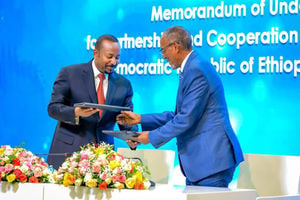
Somaliland President Muse Bihi and Ethiopia Prime Minister Abiy Ahmed
As David Laitin and Said Samatar (1987) aptly argued, Somalia, now rising from the ashes of a protracted Civil War, is a “nation in search of a state”. Inversely, Ethiopia, reeling under the effects of the civil war in Tigray and flaring insurgencies in the Oromo and Amhara regions, is a “state in search of a nation”.
As a distraction from domestic strife, Ethiopia, Africa’s largest landlocked country, is asserting its “right of access” to a seaport on the Red Sea coast. Ethiopia’s best-case scenario would be to retake the port of Assab its gateway to the world and naval base until 1991 when Eritrea gained independence.
But waging war against Africa’s most strategic nation with one of the largest armed forces on the continent said to exceed 200,000 troops is not an option, at least for a moment. Ethiopia’s Prime Minister Abiy Ahmed Ali saw a weak and disorganised Somalia as a softer target. As a jolt from the blues, in January 2024, Abiy signed a controversial Memorandum of Understanding (MoU) with Somalia’s breakaway territory of Somaliland which provided for 20 kilometres of Somalia’s Red Sea coastline to Ethiopia in exchange for recognition of Somaliland as a sovereign state.
Despite mounting international pressure, Abiy is playing a high-stakes game. Even without notifying or inviting Somalia, on October 16 Ethiopia called a ministerial meeting of AU Troop Contributing Countries (TCCs) to the African Transmission Mission to Somalia (ATMIS) — Burundi, Djibouti, Kenya, and Uganda — to discuss the transition from ATMIS to the new African Union Support and Stabilization Mission (AUSSOM) by January 2025. Mogadishu has already registered its protest against Ethiopia’s misused of its privileged position as the seat of the African Union to prevent Somalia President Hassan Sheikh Mahmoud from attending the February 2024 Summit and freely transact Somalia’s business.
New embassy
It never rains but it pours. On October 16, 2024, Ethiopia made good its promise to recognize Somaliland. It controversially allocated land for a new embassy to Somaliland, which has officially broke ground for its new embassy. Predictably, Ethiopia is backing Somaliland President Muse Bihi Abdi to win a second 5-year term in the coming Presidential elections slated for November13, 2024.
Ethiopia underestimated a rising Somalia, which has adopted a smart power approach that blends military pacts with the soft power of diplomacy to assert its sovereignty. Villa Somalia maintains that Ethiopian troops should vacate Somalia by December 31. It has effectively used its growing diplomatic muscle to isolate Africa’s second most populous country. In December 2023, the UN Security Council unanimously adopted Resolution 2714 to lift the arms embargo it had imposed on the Federal Government of Somalia over three decades ago, potentially enabling Somalia to build a strong military. The same month, Somalia rejoined the international Financial Institutions. In March 2024, Somalia became the eighth member of the East African Community (EAC) whose three members — Burundi, Kenya and Uganda — provide the bulk of ATMIS troops fighting al-Shabaab. Since June, Somalia is a non-permanent member of the UN Security Council. Somalia is successfully using these diplomatic spaces to make its case to the world.
Mogadishu has effectively spawned new anti-Ethiopian alliances in the Horn and Red Sea region. A tripartite anti-Ethiopian alliance involving Egypt, Eritrea and Somalia has emerged. Each of these countries has a bone to pick with Ethiopia. On October 10, the alliance held a trilateral summit to agree on a collective plan to counter Ethiopia’s plans follow through on its port deal with Somaliland and to build a navy on the Red Sea. In March Somalia signed an oil and gas cooperation deal with Turkey followed by a comprehensive maritime and defence agreement in June. In August, Somali President Hassan Sheikh Mohamud signed a mutual defence pact with his Egyptian President Abdel Fatah El-Sisi.
All regional and international efforts to broker a peaceful solution have hit a dead end. Initiatives by both Djibouti and Kenya to mediate the Ethiopia-Somali conflict ended prematurely in April. Türkiye's mediation in the August--September hiatus is grinding to fruitless end. Somalia maintains that no future talks can take place unless Ethiopia recognizes its sovereignty.
In October 2022, against the backdrop of the Ministerial meeting convened by Ethiopia, President Hassan undertook a shuttle diplomacy to its troop contributing Countries (Burundi, Kenya and Uganda and Djibouti). Villa Somalia is seeking the support of Burundi, Djibouti, Kenya and Uganda to agree on modalities of ensuring a flawless transition to prevent al-Shabaab from exploiting a potential security vacuum that could arise from the ATMIS-AUSSOM change-of-guard.
Large centralised military
In the past, Somalia has been the belligerent, claiming the ‘lost territories’ of Djibouti, Ethiopia and Kenya to unify all Somali population in the Horn under a ‘Greater Somalia’. Ironically, roles have changed. It is not an expansionist Ethiopia that seeks to occupy territories of Somalia in its wider scheme to re-create a “Greater Kush”.
But war with Somalia is unlikely to pay off. Somalia may not have a large centralised military, but its strong society has a long history of resistance against external invasion. From the ‘Black Hawk Down” incident that forced America to withdraw its troops from Somalia in 1994 to the guerrilla activities of clan-based militias that forced the Ethiopian military to pull out of Somalia in 2006, community-based militias are the real defenders of Somalia. Somali clans inside Ethiopia and in Somalia are already resisting Ethiopia’s annexation of their Red Sea territory. Even if Abiy gains access to the sea through the MoU, the cost of guarding the corridor to the sea will be too huge for Ethiopia to bear. Unbeknown to many, Somaliland is ‘the Soul’ of the Somali Nation. As the cradle of Somali people, it is the heartland of Somalia’s cultural heritage including poetry, music and main nationalist icons.
Dialogue, leading to Ethiopia’s unequivocal recognition of Somali’s sovereignty, is the surest pathway to sustainable peace. But will Abiy retreat from the deal with Somaliland? Perhaps no. The culture of politics in Ethiopia’s history has no room for leaders who appear weak in the eyes of the public. They risk being removed from office. It is all about egos.
Professor Peter Kagwanja is former Government Adviser and currently Chief Executive at the Africa Policy Institute and Adjunct Professor at the University of Nairobi.










